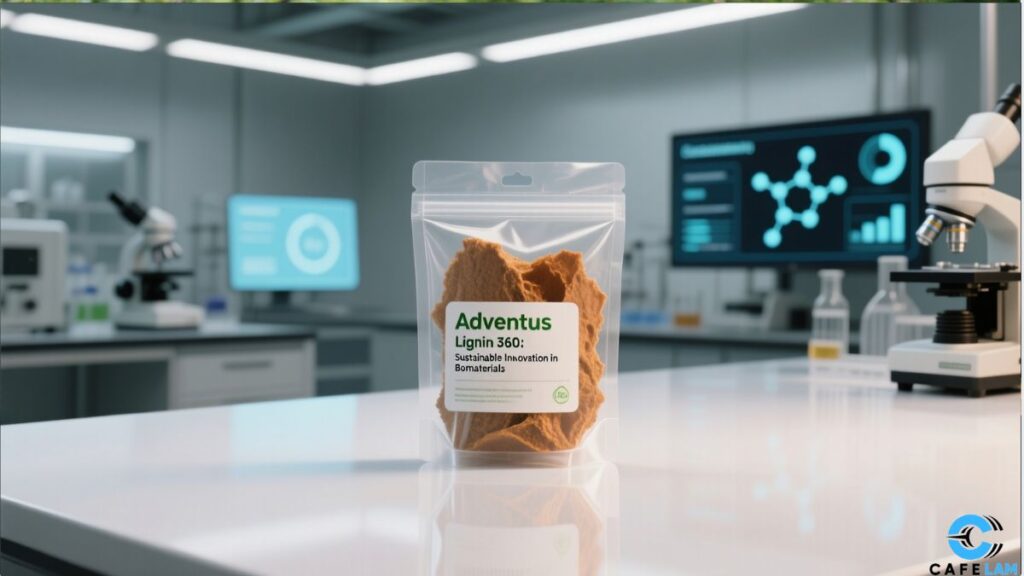In the global shift toward sustainability, Adventus Lignin 360 has emerged as a pioneering force in the development of renewable biomaterials. Derived from lignin—one of the most abundant natural polymers on Earth—this advanced material is redefining how industries approach eco-conscious manufacturing. Unlike traditional petrochemical-based additives, Adventus Lignin 360 offers a sustainable, high-performance alternative that supports environmental responsibility without compromising on quality or functionality.
Lignin is a complex organic polymer that provides structural support in plant cell walls. It is a byproduct of the paper and pulp industry, where it is typically separated from cellulose during processing. Historically, much of this lignin was burned for energy or discarded as waste. However, Adventus has transformed this overlooked resource into a valuable, engineered material with wide-ranging applications. By refining and enhancing natural lignin, Adventus Lignin 360 delivers consistent performance, making it ideal for integration into modern industrial processes.
The Science Behind Adventus Lignin 360
How Is It Produced?
The production of Adventus Lignin 360 begins with sustainably sourced biomass, primarily from wood and agricultural residues. Through a proprietary extraction and purification process, lignin is isolated with minimal environmental impact. Adventus employs advanced green chemistry techniques to modify the molecular structure of lignin, improving its solubility, thermal stability, and compatibility with other materials.
This refined lignin is then standardized into a high-purity product that maintains batch-to-batch consistency—critical for industrial use. The result is a versatile biomaterial that can be tailored to meet the demands of various sectors, from construction to consumer goods.
Why Lignin Matters in Sustainability
Lignin is not just abundant—it’s renewable, biodegradable, and carbon-capturing. Plants absorb CO₂ as they grow, locking carbon into their biomass. When this biomass is used to produce Adventus Lignin 360, the carbon remains sequestered in the final product, contributing to a net reduction in greenhouse gas emissions. This makes Adventus Lignin 360 a carbon-smart alternative to fossil-based materials.
Moreover, by repurposing a waste stream from the paper industry, Adventus supports circular economy principles. Instead of treating lignin as a byproduct, it becomes a high-value input, reducing industrial waste and creating new economic opportunities.
Key Benefits of Adventus Lignin 360
The advantages of Adventus Lignin 360 extend across environmental, economic, and technical domains. Below are the primary benefits that make it a standout solution in the green materials space:
- Renewable Sourcing: Made from plant-based biomass, reducing reliance on finite fossil fuels.
- Biodegradability: Naturally breaks down at end-of-life, minimizing environmental pollution.
- High Performance: Offers excellent binding, reinforcing, and UV-resistant properties.
- Industrial Compatibility: Works seamlessly with existing manufacturing systems.
- Carbon-Negative Potential: Helps industries lower their carbon footprint through sustainable substitution.
- Cost Efficiency: As production scales, costs are expected to decrease, making it competitive with traditional materials.
These benefits position Adventus Lignin 360 as a smart choice for companies aiming to meet sustainability targets while maintaining product quality and operational efficiency.
Applications of Adventus Lignin 360 Across Industries
1. Road Construction and Asphalt Modification
One of the most promising uses of Adventus Lignin 360 is in road infrastructure. When added to asphalt, lignin acts as a natural binder that enhances flexibility and durability. Roads made with lignin-modified asphalt show reduced cracking, improved resistance to temperature fluctuations, and longer service life. This not only lowers maintenance costs but also reduces the need for frequent resurfacing, which in turn cuts down on emissions from construction activities.
2. Tire and Rubber Manufacturing
The rubber industry relies heavily on carbon black to strengthen tires and improve wear resistance. However, carbon black is derived from petroleum and has a high carbon footprint. Adventus Lignin 360 serves as a sustainable alternative, offering similar reinforcement properties while being renewable and biodegradable. Early trials show that tires incorporating Adventus Lignin 360 exhibit reduced rolling resistance, leading to better fuel efficiency and lower vehicle emissions.
3. Sustainable Packaging Solutions
With plastic pollution reaching crisis levels, the packaging industry is under pressure to innovate. Adventus Lignin 360 can be used as a coating or adhesive in biodegradable packaging materials. When combined with cellulose or starch-based films, it creates strong, water-resistant, and compostable packaging. This makes it ideal for food containers, shipping materials, and single-use products that need to decompose safely after use.
4. Agriculture and Soil Enhancement
In agriculture, Adventus Lignin 360 is being explored as a slow-release agent for fertilizers and soil conditioners. Its natural binding properties help retain nutrients in the soil, reducing runoff and preventing water contamination. Additionally, lignin-based amendments can improve soil structure and moisture retention, supporting healthier crop growth and reducing the need for chemical inputs.
5. Bioplastics and 3D Printing
As demand grows for bio-based plastics, Adventus Lignin 360 is being tested as a filler or matrix component in bioplastics. Its thermal stability and mechanical strength make it suitable for injection molding and 3D printing applications. This opens up possibilities for sustainable consumer goods, medical devices, and industrial components made from renewable materials.
ALSO READ THIS POST:
Adventus Lignin 360 vs. Traditional Materials: A Comparative Overview
To better understand the advantages of Adventus Lignin 360, here is a side-by-side comparison with conventional industrial materials:
This comparison clearly illustrates why Adventus Lignin 360 is emerging as a preferred choice for environmentally conscious manufacturers.
Sustainability and Supply Chain Integrity
Adventus places a strong emphasis on ethical sourcing and supply chain transparency. The raw materials for Adventus Lignin 360 are obtained from certified sustainable forests and biorefineries that follow responsible harvesting practices. Every batch is traceable, allowing customers to verify the origin and environmental credentials of the product.
By creating value from what was once considered waste, Adventus also supports rural economies and promotes sustainable forestry. This holistic approach ensures that environmental, social, and economic benefits go hand in hand.
Future Prospects and Ongoing Research
The potential of Adventus Lignin 360 is still being unlocked through ongoing research and development. Scientists are exploring new frontiers, including:
- Nanotechnology: Developing lignin nanoparticles for use in high-strength composites and coatings.
- Water Purification: Using lignin’s binding properties to remove heavy metals and pollutants from wastewater.
- Biomedical Applications: Investigating its use in biocompatible wound dressings and drug delivery systems.
- Energy Storage: Testing lignin-based materials for use in eco-friendly batteries and supercapacitors.
These innovations highlight the versatility of Adventus Lignin 360 and its potential to impact sectors far beyond its current applications.
Why Businesses Should Consider Adventus Lignin 360
For companies aiming to meet ESG (Environmental, Social, and Governance) standards, reduce their carbon footprint, and appeal to eco-conscious consumers, Adventus Lignin 360 offers a practical and scalable solution. It requires minimal changes to existing production lines, ensuring a smooth transition from conventional materials. Additionally, early adopters gain a competitive advantage by positioning themselves as leaders in sustainability.
Regulatory trends worldwide are increasingly favoring bio-based materials, with bans on single-use plastics and stricter emissions standards on the rise. By integrating Adventus Lignin 360 now, businesses can future-proof their operations and stay ahead of compliance requirements.
Frequently Asked Questions (FAQs)
1. What is Adventus Lignin 360 used for?
Adventus Lignin 360 is used in asphalt, tires, packaging, agriculture, and bioplastics as a sustainable alternative to fossil-based materials.
2. Is Adventus Lignin 360 safe for the environment?
Yes, it is biodegradable, non-toxic, and derived from renewable sources, making it environmentally safe.
3. Can it replace plastic entirely?
While not a full replacement for all plastics, it can substitute petroleum-based additives and enhance biodegradable materials.
4. How does it reduce carbon emissions?
By replacing carbon-intensive materials and utilizing carbon-absorbing biomass, it lowers overall greenhouse gas output.
5. Where can I source Adventus Lignin 360?
It is available through Adventus and authorized industrial suppliers; contact their sales team for distribution details.






